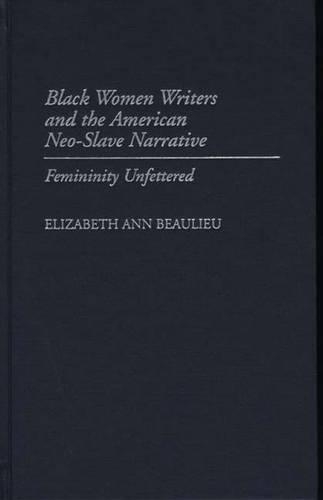
Black Women Writers and the American Neo-Slave Narrative: Femininity Unfettered
(Hardback)
Publishing Details
Black Women Writers and the American Neo-Slave Narrative: Femininity Unfettered
By (Author) Elizabeth A. Beaulieu
Bloomsbury Publishing PLC
Praeger Publishers Inc
30th March 1999
United States
Classifications
Tertiary Education
Non Fiction
Gender studies: women and girls
Literary studies: general
Slavery, enslaved persons and abolition of slavery
810.09928708996
Physical Properties
Hardback
200
Width 140mm, Height 216mm
369g
Description
The neo-slave narrative is an important development in American literary history and has serious revisionist intentions at its foundation. This book examines how contemporary African American women writers have shaped the genre. These authors have written neo-slave narratives to reinscribe history from the perspective of the African American woman, most specifically the nineteenth century enslaved mother. The writers considered in this studySherley Anne Williams, Toni Morrison, J. California Cooper, Gayl Jones, and Octavia Butlerexplore American slavery through the lens of gender, both to interrogate the myth that enslaved women, denied the privilege of having a gender identity by the institution of slavery, were in fact genderless, and to celebrate the acts of resistance which enabled enslaved women to mother in the fullest sense of the term. The volume begins with an overview of historical representations of slavery in America, from the slave narrative itself to the revisionist scholarship of the 1960s. The book then examines several individual neo-slave narratives, such as Margaret Walker's Jubilee (1966), Williams' Dessa Rose (1986), Morrison's Beloved (1987), Cooper's Family (1991), Jones' Corregidora (1975), and Butler's Kindred (1979). What the women in these novels have in common is the fact that they mother; what the writers have in common is a tendency to utilize subversive strategies such as reversal, blurring, and the creation of myth to dramatize gender identity and to highlight the varied nature of motherhood as enslaved women experienced it. The final chapter evaluates the influence of the neo-slave narrative on American literature in general and on popular perceptions and misperceptions of African American women.
Reviews
The book raises important questions and as a starting point for individual study of the neo-slave narrative it offers a thorough bibliography. The title and table of contents alone will help to frame courses and perspectives for further study.-Southern Literary Journal
"The book raises important questions and as a starting point for individual study of the neo-slave narrative it offers a thorough bibliography. The title and table of contents alone will help to frame courses and perspectives for further study."-Southern Literary Journal
Author Bio
ELIZABETH ANN BEAULIEU is a Lecturer at Appalachian State University, where she teaches African American Literature.
